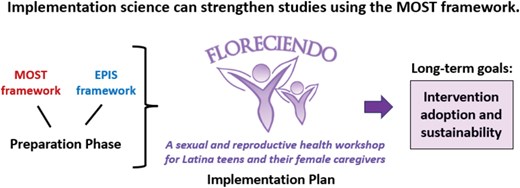-
Views
-
Cite
Cite
Katherine G Merrill, Jacqueline Silva, Angela Sedeño, Susana Salgado, Sara Vargas, Jennifer K Cano, Veronica Nabor, Jamison C Merrill, Jeff DeCelles, Kate Guastaferro, Ana A Baumann, Jacqueline Fuentes, Laura Rodriguez, Vanessa Melgoza, Geri R Donenberg, Preparing to implement Floreciendo with Latina teens and their female caregivers: Integrating implementation science and the multiphase optimization strategy framework, Translational Behavioral Medicine, Volume 15, Issue 1, 2025, ibaf005, https://doi.org/10.1093/tbm/ibaf005
Close - Share Icon Share
Abstract
Practical examples of studies integrating implementation science and the multiphase optimization strategy (MOST) framework are lacking. Floreciendo is a sexual and reproductive health program for Latina teens and their female caregivers, adapted from the IMARA evidence-based program.
We prepared for delivering Floreciendo by developing an implementation plan to support the program’s adoption and sustainment.
Drawing on a community-based participatory research approach, we used qualitative methods to explore program logistics, implementation determinants and strategies, adoption, and sustainability. We positioned our study activities within the preparation phases of both the MOST and the EPIS frameworks. We conducted and rapidly analyzed seven focus group discussions—one with Latina teens (n = 9), one with female caregivers (n = 6), four with organizational staff (n = 32), and one with IMARA staff (n = 6)—and seven key informant interviews.
Participants described community organizations as the preferred location for workshops in offering a “safe space.” They recommended workshop delivery on two days over separate weekends. Teens and caregivers requested relatable, bilingual Latina facilitators. Implementation barriers were raised (e.g. work conflicts) with strategies to address them (e.g. provide stipends). Organizational adoption was perceived as likely since the workshop addresses clients’ needs and fits with organizational values. Recommendations for sustainment included identifying funding opportunities specific to each organization.
Findings directly informed our immediate plans to optimize Floreciendo using the MOST framework and principles and our long-term goals for adoption and sustainability. Implementation science can strengthen studies using the MOST framework.

Lay Summary
• Why was this study done? Floreciendo is a sexual and reproductive health program for Latina teens and their female caregivers. We researched how best to implement the program, including exploring what would support the program’s delivery, potential barriers we would face when delivering Floreciendo, and strategies we could use to help the program succeed.
• What did we do? We worked as a team of community organizations, university researchers, Latina teens, female caregivers, and others experienced in sexual and Latina health. We integrated the phases of the EPIS framework (which supports implementation planning) with the MOST framework (which focuses on optimizing an intervention through decision-making based on real-world constraints). We rapidly analyzed seven focus groups and seven key-informant interviews.
• What does this paper add? We provide a practical example of how researchers can develop an implementation plan while using the MOST framework. We learned about key considerations for implementing Floreciendo (e.g. where and when the program should take place, who should facilitate it, barriers we might face, and strategies to address them). We also gained perspectives on the program’s potential adoption within organizations and how we can support its continued delivery. We highlight the importance of partnerships between community stakeholders and researchers to achieve our goals.
• What do the findings mean? Findings will play a key role in creating and implementing a program to support Latina teens over the long term. Our findings can also inform future studies that use the MOST framework.





